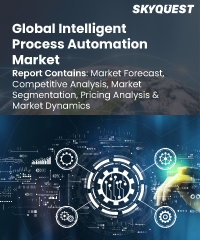
Report ID: SQMIG45F2107

Report ID:
SQMIG45F2107 |
Region:
Global |
Published Date: July, 2024
Pages:
250
|
Tables:
121 |
Figures:
77
Drivers
Operational Efficiency-Growing Demand
Operational efficiency demanded by various industries across the globe is one of the major reasons contributing towards the growth of the IPA market. Since there is a growing demand, businesses are increasingly looking for ways to enhance productivity with the help of automation solutions to minimize human intervention and accelerate the processes of operations. Business entities can automate cumbersome and repetitive operations with the help of intelligent automation technologies including ML and RPA. Business entities can reduce costs significantly by incorporating these technologies into their operation, gaining operational benefits. In this way, companies can improve their service quality by reducing errors and speeding up the pace of their turnarounds, marking their market adoptions and further dissemination.
Machine Learning and AI: Emerging Trends
The major drivers in the IPA market include rapid developments in machine learning and artificial intelligence. With the advancement of these technologies, automation solutions have become more intelligent and adaptive. AI-powered systems can analyze large volumes of data on their own, can spot patterns, and make judgments with little human help. Continuously learning from new data, the machine learning algorithms improve with time, hence making predictions and auto-responses more accurate. It is these advancements that result in advanced and efficient automation systems, which, in turn, have been driving their increased adoption in a wide array of industries.
Restraints
Exorbitant Implementation Costs
One of the major factors hindering the growth of the intelligent process automation market is the high implementation cost. Advanced automation technologies, such as AI and ML, in many cases require huge investments in hardware, software, and human resources. In the case of SMEs, huge investment in the initial setup and even maintenance and updates become a huge overhead amount. In addition, costs will further rise because of the challenge of integrating new and innovative systems with existing infrastructure. Financial constraints are thus predicted to restrain firms' enthusiasm for automating processes using technologies; hence affecting market growth.
Data Security and Privacy Concerns
Data security and privacy-related problems are thus the major obstacle in the path of the intelligent process automation market. Automation systems are always a luring target for cyber-attacks as often private and sensitive data are processed via automation systems. While challenging, priority should be given to ensuring sound security measures and compliance with data protection laws, including GDPR. Businesses should invest in advanced security procedures and processes that can prevent security breaches and retain the confidence of their clients. Automation's advantages which might accrue will have to be weighed against the risks related to data security and privacy. With such concerns, it may be difficult to employ the technology of automation on the part of those businesses that balance potential advantages against such risks.
Our industry expert will work with you to provide you with customized data in a short amount of time.
REQUEST FREE CUSTOMIZATIONWant to customize this report? This report can be personalized according to your needs. Our analysts and industry experts will work directly with you to understand your requirements and provide you with customized data in a short amount of time. We offer $1000 worth of FREE customization at the time of purchase.

Report ID: SQMIG45F2107